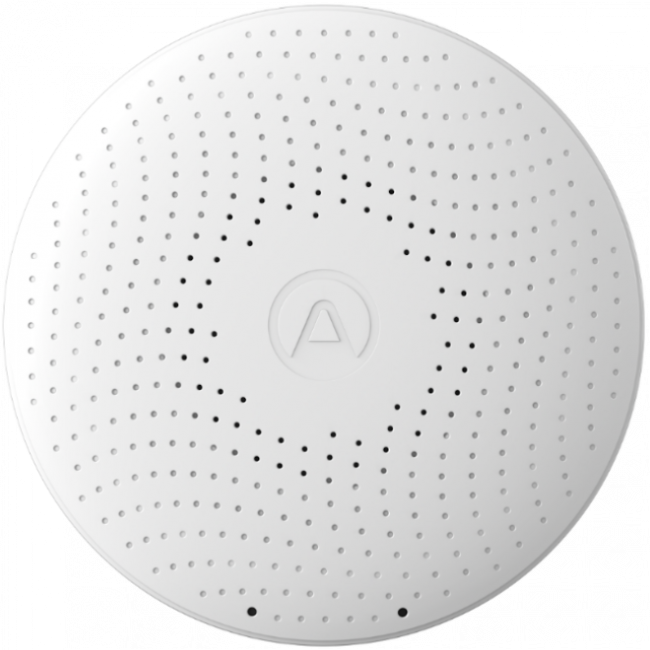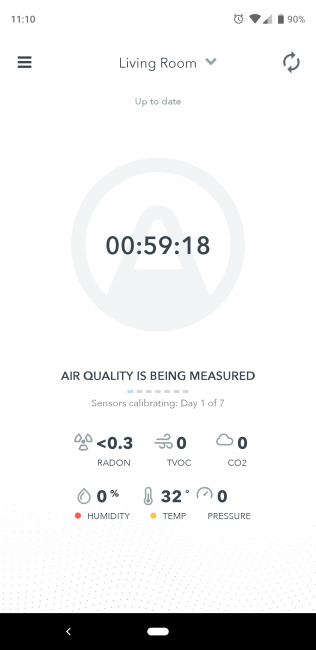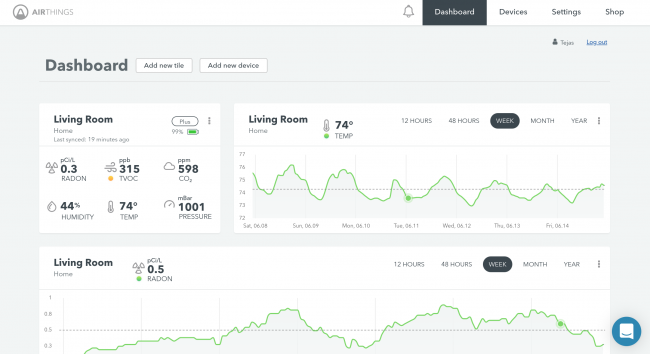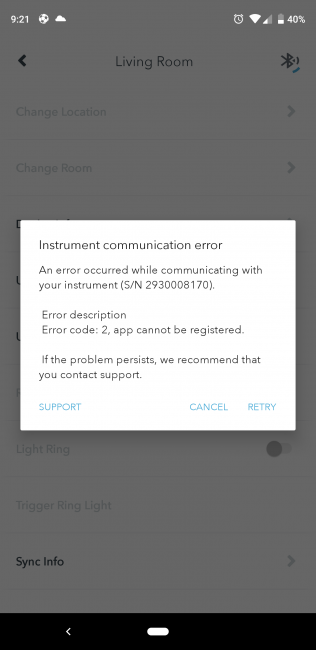We measure data points on many things in our lives these days, from our weight to our steps to even our heart rate. Apart from being fun to look at, having access to this data helps us to make informed decisions that can improve our lives. The Airthings Wave Plus provides data about the indoor air quality where you install it, but then ultimately doesn’t tell you much about what that data means.

The AirThings Wave Plus is a battery operated internal air quality (IAQ) device in the AirThings line-up that, apart from measuring Radon, includes many other sensors such as temperature, air pressure, and humidity. The design makes me think of it as a fancy smoke detector given the circular shape and the color, and I believe that was done intentionally. It’s a very nice looking device with a good build quality that will not look out of place in anyone’s home. Most people will either not notice it at all, or if they do, will think it’s some sort of home appliance or sensor. To me, that is a success for the designers at AirThings.
The device itself also does not, surprising to me, connect to your home WiFi in any shape or form. Instead, it relies on Bluetooth Low Energy (BLE) to communicate with your smartphone via the AirThings app which then acts as a relay to sync your data to the cloud. This is in some ways good and in other ways bad which I will discuss later on but it’s something to be aware of. If you don’t ensure your phone is syncing properly with the AirThings via BLE, there is no way for the data to leave the device.
The Install and Setup
The setup is extremely easy. The device itself comes with two batteries included, a wall mounting plate and a single screw. Mounting the Wave Plus is both easy and one of my favorite things about it. Pick a spot on your wall where you would want to put it, and screw in the wall mount directly into the drywall. The device weighs basically nothing so you shouldn’t need anchors for this. Then comes my favorite part, the mount is magnetic! I know this may seem like an overreaction but for some reason, I just think magnets are awesome but underused in home electronics these days. This magnetic mount is a very elegant solution, and I really wish other companies would take inspiration from this for any of their products that require some type of wall mount. As you can see in the video above, popping the Wave Plus on the wall gives that oh-so-satisfying click and it’s still easy enough to remove it if you need to.
After that, it’s just a matter of setting up the device using the AirThings Wave app via the iOS AppStore or the Google Play Store. The app does a good job walking you through the setup process including finding the device from your smartphone and then checking for updates. My Wave Plus had a firmware update pending when I set it up and the install of the update went smoothly, although it did take longer than I expected.
Once that’s done, you will be greeted with this screen in the app which in a somewhat anticlimactic way informs you, that you have to wait an hour for the first readings.

Initial setup requires patience
Further, even after that, it takes 7 days, 7 days, for the sensors to calibrate so basically you need to wait a week before you are supposed to really take the data coming out with any seriousness. This isn’t too crazy but one thing to keep in mind is if you bought this with say a 14-day return policy then it might take half of that time to even truly try it out properly.
Just Data And Not Much Else
So after waiting the one hour to start seeing data and then patiently waiting another week for the sensors to calibrate, what do you get? Well honestly, just a lot of cool looking data but not much else. What I mean, is that during my time with the AirWave Plus it appeared to function as advertised and provided readings that from the best I could tell could have been accurate. The problem, and this is a big one for me, is there was zero contextual information provided to help a user understand what the data meant.
There is color coding with green being obviously good, orange in the middle and red being bad. But again, that doesn’t really help a user understand how significant of an issue it might be or actions to take to improve it. When I took the screenshots in the slideshow above the air quality was reported as just being average and from what I can gather it’s because the TVOC is above average. Do you know what that means? I sure don’t. There’s nothing in the application that I could find which explained what TVOC is, what it means if it’s above the average or what I’m supposed to do to improve the situation. After I Googled it, I realized it had to do with particulate matter in the air as a measurement of how clean the air was that you are breathing. Ironically this information is readily available on the AirThings site itself! I have no idea why this couldn’t have been incorporated into the mobile app which obviously is how everyone will interact with the device.
Earlier I had a time with CO2 was in the red and I couldn’t for the life of me understand why or how serious of an issue this was. As the father of young children I was alarmed when this happened but because of the lack of information in the app, spent time Googling and learned that CO2 can be emitted from things like a gas stove for example which made more sense since the time when the CO2 had shown as being high was after times there had been some extensive cooking going on.
Then there’s the lack of any notifications at all within the mobile app. I’m using the Android version and I’ve never received any notifications from the app during the time I’ve had it. Now there is a light ring on Wave Plus that glows different colors when you wave your hand and will turn orange or red but why can’t there just be a notification in the app? Even when the CO2 level was red there was no notification at all. In the settings, there is a toggle for a Radon alarm and it’s defaulted to on but it makes me question whether it would even work at this point.

AirThings Dashboard
There is an online dashboard as well that gives you basically the same data but given it’s on a desktop you have more space to look at it – but from what I saw it was nothing additional to what you can see in the mobile app. Surprisingly, there is a little alerts icon at the top that had some alerts about readings being high but even here it was purely informative with no contextual information explaining what it all means.
Then comes what I had mentioned before about the decision to use BLE over native WiFi for connectivity. Clearly, the decision was made to make this battery operated since BLE is far better suited to batteries than WiFi. That’s all well and good, but I found connectivity to be spotty at best. Many times, no matter how many times I told it to sync and update it would not. Some of the times I could close the app (swipe away) and try again and it would work. This didn’t work every time and when I went into Device Info in the app, I noticed while the Cloud sync (phone sync to AirThings online) was recent the BLE sync (phone sync to the Wave Plus) was sometimes days old!

Had to reboot to recover from this
To make matters worse, as I was about to write this review, I went to sync the data so I had updated info and I got the screen shown above. Clicking on Support took me to an unhelpful FAQ and I couldn’t find anything to help. Googling for that error code didn’t yield much help either but had the usual results of trying to kill app, restart phone, etc. I went ahead and restarted my Pixel 3XL and sure enough, it reconnected to the Wave Plus. It’s possible it’s a phone issue, but I use it daily with lots of Bluetooth devices without issues. Also if you read some of the reviews on either the Apple or Google Play store you will find other people complaining about connectivity as well.
Making Sense of It
The Wave Plus is a nicely built device that does what it is advertised to do, which is provide data of indoor air quality. It has an awesome magnetic wall mount (seriously please everyone copy this!) and the mobile app itself is easy to use. Where it all falls apart is the complete lack of explanation or analysis of the data that it provides so the user can better understand what is going on. If AirThings can update their applications and focus more on data analytics so rather than just throwing numbers, graphs and other raw data up they are talking to users in simple terms as to what they are breathing then they would have a great product. As of now, this is a purchase I would only suggest to data junkies who either already know enough or are willing to research all the air quality metrics and do the data analysis themselves.
The AirThings Wave Plus is available for $269 on the AirThings Store and $249 on Amazon
Source: Manufacturer supplied review sample
What I Like: Sleek look and good build quality; Set up is extremely easy; Magnetic wall mount!; Sensors appear to work and provide measurements; The mobile app is easy to use
What Needs Improvement: no easy to understand analysis or explanation of data; BLE connectivity is unreliable; The device could not have synced for days and you would not know!; No notifications for metrics out of nominal range; Online dashboard doesn’t add anything to the mobile app; Price is too high for something to have the issues it has
